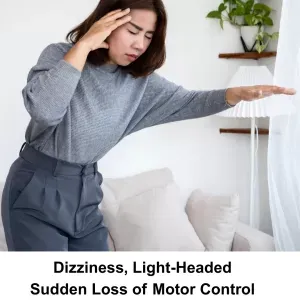By Xiaomei Cai, L.Ac., Ph.D. and Qineng Tan, L.Ac., Ph.D.

Lightheaded and dizzy? Passing out for no reason or fainting without warning? Syncope, or vasovagal passing out due to a loss of blood flow to the brain, is also known as a vasovagal attack. Acupuncture can help regulate the autonomic nervous system and blood flow to prevent fainting and syncope.
A syncope episode, or vasovagal passing out, can be scary for the person fainting and for the people around them, because it happens suddenly. Usually, the fainting spell only lasts for a minute or two. The underlying causes of syncope can be complex, involving the nervous system, heart, or circulatory system.
What Causes Syncope?
Syncope definition: The term “syncope” refers to a temporary loss of consciousness due to reduced blood flow to the brain. One of the most common forms, vasovagal syncope, occurs when the vagus nerve triggers a sudden drop in blood pressure and heart rate.
A vasovagal attack happens when a trigger, such as stress, pain, standing too long, or sudden changes in posture, causes the vagus nerve to send signals that lower heart rate and dilate blood vessels. Blood pressure drops, less blood reaches the brain, and the person loses consciousness.
Other types of syncope may be caused by cardiac arrhythmias, orthostatic hypotension, or neurological conditions.
Top 5 Symptoms of Syncope

Although fainting often comes on suddenly, many people who suffer from fainting vasovagal syncope notice warning signs beforehand. Signs that a vagal attack is imminent may include:
- Feeling lightheaded or dizzy
- Sudden nausea, queasiness
- Blurred vision, tunnel vision
- Cold, clammy skin, sweating, flushing, or sudden pallor
- Ringing in the ears (tinnitus) or muffled hearing
Afterward, some people feel tired, weak, or mentally foggy for a few minutes or a few hours.
Syncope Diagnosis
When someone has been experiencing fainting spells, a physician will usually try to identify whether the cause is cardiac, neurological, or vasovagal in origin. Tests may include ECG, echocardiography, tilt-table testing, or blood work.
If episodes are vasovagal, standard recommendations include:
- Avoiding known triggers like dehydration, overheating, or standing still for long periods
- Learning counter-pressure maneuvers (such as leg crossing or hand gripping) to increase blood pressure during early warning signs
- Medications such as beta-blockers or fludrocortisone in severe or frequent cases
- In rare cases, pacemaker implantation
While these recommendations for syncope can reduce fainting episodes, they may not always address the underlying autonomic imbalance. Acupuncture and TCM can provide a more holistic solution that addresses the deeper issues that are leading to vasavagal passing out.
Can Acupuncture Help Syncope?
In Traditional Chinese Medicine, fainting is often considered to be a sudden loss of consciousness due to Qi deficiency, Qi and Blood stagnation, or excess pathogenic factors disrupting the flow of energy to the head.
Some common TCM patterns that may underlie syncope include:
- Qi and Blood Deficiency – When the body lacks nourishment, the brain is deprived, leading to dizziness and collapse.
- Liver Qi Stagnation with Heat – Emotional stress and tension cause sudden disruptions of the flow of Qi, triggering fainting spells.
- Phlegm-Damp Obstruction – Excess dampness and phlegm block clear Yang from rising, clouding the head.
- Excess Wind or Cold – External factors can constrict channels, cutting off circulation to the brain.
An acupuncture practitioner will focus their treatment protocol on balancing pathogenic forces, such as wind and cold, or heat and dampness, and strengthening Qi energy to prevent recurrence of fainting and dizziness.

Acupuncture is an excellent modality for helping to stabilize blood pressure and regulate vagal activity and the autonomic nervous system.
In addition to acupuncture, herbal formulas may be prescribed to strengthen Qi, clear heat, resolve phlegm, or calm the Shen (spirit). Therapies such as cupping, gua sha, and breathing exercises can also support circulation and prevent stagnation.
Several studies have shown that acupuncture can reduce fainting episodes and improve autonomic stability.
Recent research is helping modern medical science better understand that the autonomic nervous system is, perhaps, one of reasons that acupuncture works. The needling of acupuncture points stimulate sensory nerve fibers, which are connected throughout the body, as signals moving along the spinal cord to and from the brain.
This is what allows for acupuncture treatment to positively affect the brain, nervous system activity, relieve pain, and reduce inflammation throughout the body.
One study concluded that acupuncture can affect autonomic responses by activating parts of the brain when the sympathetic and sympathetic nervous system activities are out of balance.
A study looked at the use of acupuncture as an emergency treatment for syncope and found that the effect of acupuncture treatment for helping to normalize blood pressure and heart rate and bring the body back into homeostasis.
Another study followed three patients with syncope, with different presentations, according to TCM diagnostic criteria (yin deficiency, yang deficiency, and excess phlegm with qi deficiency). All three patients found relief from their symptoms after receiving individualized treatment with acupuncture and herbs.
Acupuncture Near Me for Syncope in Los Angeles
Living with syncope or vasovagal fainting can feel limiting and unpredictable. Acupuncture and TCM provide time-tested methods to calm the nervous system, restore healthy circulation, and strengthen your overall resilience. If you or someone you know struggles with fainting or frequent dizziness, integrative care can provide relief and help you regain a sense of stability. Contact Art of Wellness Acupuncture today to schedule a consultation and learn how acupuncture can help you prevent syncope episodes and feel more balanced and secure in your daily life.
*This article is for education from the perspective of Traditional Chinese Medicine only. The education provided by this article is not approved by FDA to diagnose, prevent, treat and cure human diseases. It should not stop you from consulting with your physician for your medical conditions. Traditional Chinese Medicine is based on Qi, which is an invisible force that usually cannot be observed by modern science. Because science focuses on testing ideas about the natural world with evidence obtained through observation, these aspects of acupuncture can’t be studied by science. Therefore acupuncture and Chinese herbs are often not supported by double-blind, randomized trials, and they are considered alternative medicine therapies in the United States.
